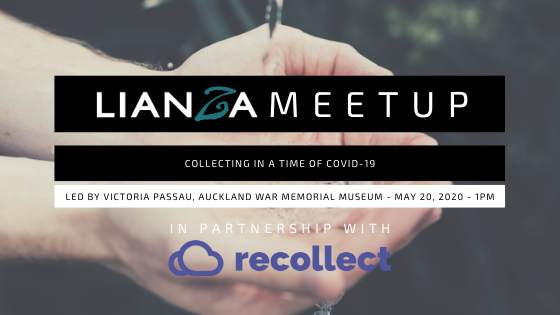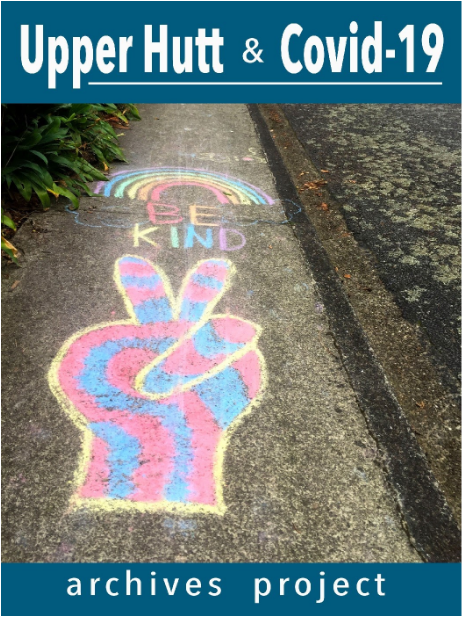“History and the archival record is really important to help us get perspective. To… realise it’s unprecedented in our lifetime, but not necessarily in human history. That’s what archives and records do. They give us perspective.” |
The aim of the session was to find out what New Zealand GLAMs (Galleries, Libraries, Archives and Museums) are doing or planning to do to document the national and local response to the pandemic. The session was facilitated by me, Victoria Passau, Collection Manager Online Cenotaph at Auckland Museum.
While a number of institutions have undertaken contemporary collecting, over the past decade, in response to events such as the Christchurch mosque attacks, Tasman fires, the earthquakes in Canterbury and Kaikoura as well as the Women's March, it is still a relatively new practice for some in the New Zealand GLAM sector. This meetup was a great opportunity for the sector to share their experiences, during COVID and to consider the successes, failures and fish-hooks of rapid response collecting. The diversity of attendees and the level of engagement showed a real opportunity for creating a series of meetups that consider contemporary collecting across the GLAM sector.
The topics people were most interested in discussing related to ensuring we collect the diversity of experiences, licensing and reuse, the ethics of collecting, how we better represent vulnerable populations in these projects, the challenges around collecting in a lockdown and the concept of after care both in relation it description and preservation but also in terms of donor relationships. As some of my Auckland Museum colleagues had written in their COVID-19 Collecting Plan we need “to ensure that any collecting is undertaken in a considered and ethical manner that safeguards the well-being of communities and… staff.” Auckland Museum is happy to share their strategy. Please get in touch with me and I can send it to those interested.
CASE STUDY
| The session started off with a great example of COVID-19 collecting from Reid Perkins, the Community Heritage Coordinator at Upper Hutt City Libraries: https://uhcl.recollect.co.nz/nodes/view/30557. Upper Hutt City Libraries have utilised the Recollect platform, the sponsor for the meetup. This project included digital photos and oral history interviews via Zoom. The attendees commented how helpful it was to see a real life example. Recollect have published a resource on contemporary collecting, which covers deciding how and what to collect and challenges for contemporary collecting. You might want to read more about how Recollect can help facilitate contemporary collecting. |
Collaboration
Timing
Collecting in crisis
She also reflected that the collecting undertaken during that time have had a real influence on the quakes stories now being told.
Web harvesting
Collecting the mundane as well as the magnificent
Chris also provided a very helpful statement that could be added to organisations websites to remind people to save realia from the lock down:
LOCKDOWN IS OVER, BUT DON’T PRESS DELETE JUST YET….
Did you record your thoughts, experiences, activities during lockdown? New Zealanders found all sorts of ways to document their thoughts, experiences and activities of the COVID-19 alert level phenomenon. From videos to emails, diaries and letters, memes, tweets and artworks. In decades to come, researchers will be curious about this unique time in New Zealand’s history, and how we handled it as individuals, families, households and communities. Consider connecting with your local museum, library or community archive before you press delete or throw your creations away. We can help put you in touch.
Themes and threads
Collecting styles
- community led - i.e. a public call out
- through targeted collecting - i.e. shoulder tapping people in local communities
- Digital platforms - the public can upload content directly into the collection
- How many organisations were actively creating content vs collecting more passively (i.e. responding to offered content).
Rights and permissions
- the process for getting interviewee permissions for open access online delivery. Reid noted an individual had asked for a video to be removed but was happy for the audio recording to be used instead.
- Question how to collect digital material offered that has already been uploaded to YouTube? What rights does YouTube claim even though creators may have original data file?
- YouTube users grant a non-exclusive licence to YouTube.
- YouTube users grant a non-exclusive licence to YouTube.
- Implications of CC-BY
- Nelson Provincial Museum had put in place a Graphic and Sensitive Objects policy to accommodate authors or individuals who wanted to share material but in a more controlled or restricted manner.
- Jane Groufsky from Auckland Museum noted in the chat “with instagram you are giving Facebook a non-exclusive licence (meaning they can do what they like with what you upload) but you don’t lose copyright as the creator. The problem is usually getting content off. For still images the owner is the only one able to properly get them out and instagram sends them all to you in a zip file with new filenames (you can also get comments etc in text files). Not sure how video works from it (as video will be larger files) but I imagine it is similar in that the owner has the right to make a download from it upon request. Direct from the donor would be easier, but if direct [on] Instagram we may need [them] to get them for us is all (but I’ve not tried with video). Because they (FB) have the licence they can alter/provide them in a different format than uploaded.
Replication of content being collected
- How much have organisations considered what is being/will be collected by national institutions, in terms of not wanting to replicate material and keeping it regional and specific to your community?
Private collecting
- Are there opportunities for helping people create their own private collections, especially around traumatic events, with a view to them becoming public much later?
Next steps
Topics for follow up meetings could include writing collecting policies or plans, archiving social media file formats, storing and sharing content, outreach, collaborations between institutions and the opportunity to discuss real life examples including those from smaller institutions or communities.
Overall, the meetup showed a real commitment to collecting a diversity of voices and perspectives from across the GLAM sector. It identified the need to further build on a New Zealand community of practice for Contemporary Collecting. Participants were very appreciative of LIANZA leading this conversation and 90% of survey respondents said they would attend another similar event. Watch this space.





 RSS Feed
RSS Feed